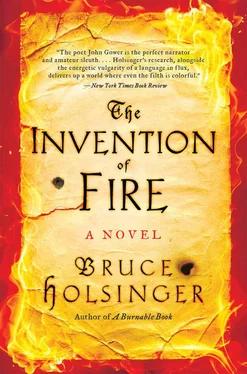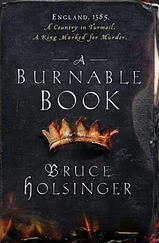Bruce Holsinger - The Invention of Fire
Здесь есть возможность читать онлайн «Bruce Holsinger - The Invention of Fire» — ознакомительный отрывок электронной книги совершенно бесплатно, а после прочтения отрывка купить полную версию. В некоторых случаях можно слушать аудио, скачать через торрент в формате fb2 и присутствует краткое содержание. Год выпуска: 2015, Издательство: HarperCollins, Жанр: Исторический детектив, на английском языке. Описание произведения, (предисловие) а так же отзывы посетителей доступны на портале библиотеки ЛибКат.
- Название:The Invention of Fire
- Автор:
- Издательство:HarperCollins
- Жанр:
- Год:2015
- ISBN:нет данных
- Рейтинг книги:3 / 5. Голосов: 1
-
Избранное:Добавить в избранное
- Отзывы:
-
Ваша оценка:
- 60
- 1
- 2
- 3
- 4
- 5
The Invention of Fire: краткое содержание, описание и аннотация
Предлагаем к чтению аннотацию, описание, краткое содержание или предисловие (зависит от того, что написал сам автор книги «The Invention of Fire»). Если вы не нашли необходимую информацию о книге — напишите в комментариях, мы постараемся отыскать её.
The Invention of Fire — читать онлайн ознакомительный отрывок
Ниже представлен текст книги, разбитый по страницам. Система сохранения места последней прочитанной страницы, позволяет с удобством читать онлайн бесплатно книгу «The Invention of Fire», без необходимости каждый раз заново искать на чём Вы остановились. Поставьте закладку, и сможете в любой момент перейти на страницу, на которой закончили чтение.
Интервал:
Закладка:
She looked over her shoulder to where the mother had wept for her boy. All was as it had been before, no trace of the diminished family, and the others in that company had mingled with the evening crowd. She turned back to him, her mind astir with new concern.
She pressed his wrist, wanting to comfort him, though unsure how to begin. “Come.” They made their way between the benches. She nodded good nights at their fellow pilgrims, received knowing smiles from Constance and Evota in return.
Outside they strolled to the street wall, a husband and wife taking a turn before going in to bed. The night air carried a spreading chill. The first week of October, yet they had traveled far already, nearly into the north country. Tomorrow they would cross the Trent at Newark.
“Tell me,” she said, her hand a ball of heat in his ample palm.
He told her.
Chapter 12
I had thought Satan’s minions were leaving us in peace, at least for the season.” William Rysying, alderman of Portsoken Ward and prior of Holy Trinity, looked at me over the pious arch of his joined hands.
“This is a special advisement, Reverend Father,” I said, unsurprised by the prior’s dry greeting. “He unchained me for one afternoon only.”
Rysyng stood and gestured for me to precede him from the almonry, unwilling to tolerate my presence within the priory. He led me briskly away from the Holy Trinity gate. The prior’s head was down, a grey cowl bunched around the neck of this short, angry, ungraceful man. A piggish nose flattened above thick, dry lips. Eyes closely spaced and incurious, of no memorable shade. Hair too thin for a proper tonsure at the front, though overgrown into greasy, almost boyish ringlets where the circle met the shave. He smelled that day of sour cheese and smoke, though the priory’s seasonal laundering had left his wool habit unsoiled, scented with lye and rosemary. We skirted the priory’s western face through the great court up to Bevesmarkes, and walked with the looming bulk of the walls to our backs.
“You wished to speak with me, Gower,” said the prior. “So, speak. You have come to buy away our cartulary, or extort a measure of gold, I suppose?”
“No, Reverend Father,” I said. “It is city business that concerns me.”
“City business. So you are here to see the alderman of Portsoken Ward, not the prior of Holy Trinity.”
“Correct.”
“By whose warrant?”
“Father?”
“By whose warrant are you here?” He lifted his chin. “For you are not a freeman of London, Gower, nor even a resident of the city. You are a Southwark man, as Southwark as those maudlyns coining away their queynts in Rose Alley. As prior I serve my house and my order. As alderman I serve the men and women of my ward, and his lordship the mayor. What I do not serve in either capacity is the disordered population of Southwark. Move to London, purchase your freedom of the city, and buy a house in my ward, Gower. There are fine tenements just without Aldgate, and along the ditch above the Tower postern. Or you might pitch a tent in the green and live with the soldiers. Until then I’ll have no doings with you.”
The prior stopped in the street. His left foot had found a mud clod, which he kicked to the gutter. His eyes gleamed with righteousness as he looked at me, tensed to turn away.
“A pleasing homily, Reverend Father,” I said quickly. “Would that a scrivener were hard by, inking it on a bill. I’d happily hang it up on the gate of Winchester Palace, for every Southwark man to see and admire.” The bishop of Winchester, a neighbor of mine across the river and recently become an ally, was fiercely proud of his Southwark domain, claiming that our growing suburb embodied the future of London.
The prior scoffed unconvincingly. “I am not afraid of Wykeham. The bishop has larger things to concern himself with than the doings of a house such as ours.”
“Perhaps,” I said. “Though the doings of its leader could bear some episcopal probing, don’t you think?”
His lip quivered. “Whatever do you mean?”
As we delayed there in the street I told him. It was a piece of information I had held on Rysyng for nearly a year, waiting for the right moment to use it. A series of liaisons with the daughter of a fellow alderman, the young woman put away to birth the prior’s child-and much worse, the purchase of a position for her in a sister house under the sworn pretense of virginity. The child was now a ward of the city of London, under the care of a Cheapside chandler.
“A whisper to the bishop, and you will be expelled from the order, lose your office and your livings.”
“You wouldn’t-you wouldn’t dare.”
“Oh, but I would, Reverend Father. I would, and with no small pleasure.”
His face reddened, his jaw shook, his head acting like an abscess about to burst. Then his eyes closed, and something resembling peace settled into his features. It is often like that at these moments, as men confront their hidden lives anew in this quick and brutal form of confession I offer. With acceptance and submission, relief displaces fear.
“What do you want?” he finally said, resuming his walk along the walls. We were nearing Bishopsgate, our paces slowing.
“The last court session, at the Guildhall.”
“What about it?”
“You and several others seemed quite intent on hearing out Peter Norris. He had something to tell the court.”
“So he claimed.”
“Why wasn’t he permitted to speak?”
“The mayor was convinced he was lying. Trying to purchase his freedom with a convenient bit of deceit.”
“You didn’t believe him either? Norris, that is?”
His eyes shot toward me, then away. He turned, and we started our walk back toward the court and the priory. “None of the aldermen know what to believe.”
“He claimed to have the name of a witness.”
“Yes.”
“To the dumping in the Walbrook.”
He nodded tightly.
“When did he first speak of it?”
“After his previous arrest, a fortnight ago,” he said, looking around cautiously as we went along. “He started chatting about it his second day in the stocks, going on to the sheriff’s boys on his return to the gaol each night. No one paid him any mind, everyone thought he was raving. Then the bodies were found. One of the serjeants told Brembre what Norris had been saying. At first the mayor was after speaking to Norris right away. Then something changed, and he refused to hear or even see the man.”
“And then?”
“Then Norris’s sentence ends. But he robs again. After the second arrest Norris was taken in by my men and thrown in the Counter.” A city gaol in Rysyng’s ward. “The next morning he started larking again, this time to my beadle, who told one of Brembre’s sheriffs, who told the mayor. And then-” He shrugged. “Then Brembre intervened. Norris’s trial would be held before the Mayor’s Court the next day, he ordered. The Guildhall would hear nothing about this other matter. London would have done with Peter Norris. And so it was. A quick trial, a quick hanging-”
“And any memory of a witness to this greater crime dies with him,” I said.
“Yes.”
“Why was Brembre so intent on keeping Norris silent?”
“Perhaps his witness saw something. Something damning, or at the least inconvenient.”
“Does Brembre know who was responsible for throwing the bodies in the channel, then?”
A short sigh, almost a gasp, as if Rysyng’s throat were reluctant to release its owner’s words. “He may.”
“And do you believe Brembre himself killed these men, or had some role in their deaths?”
The prior shook his head with confidence. “He did not, Gower. Of that I am certain.”
Читать дальшеИнтервал:
Закладка:
Похожие книги на «The Invention of Fire»
Представляем Вашему вниманию похожие книги на «The Invention of Fire» списком для выбора. Мы отобрали схожую по названию и смыслу литературу в надежде предоставить читателям больше вариантов отыскать новые, интересные, ещё непрочитанные произведения.
Обсуждение, отзывы о книге «The Invention of Fire» и просто собственные мнения читателей. Оставьте ваши комментарии, напишите, что Вы думаете о произведении, его смысле или главных героях. Укажите что конкретно понравилось, а что нет, и почему Вы так считаете.












